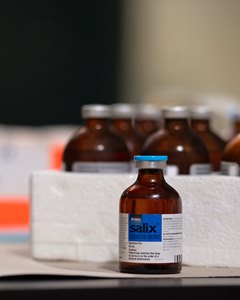KY Committee Authorizes Funding for Scoping Study


The Kentucky Equine Drug Research Council authorized the Kentucky Horse Racing Commission to spend up to $30,000 to participate in a scoping study of the lungs of 2-year-olds led by Dr. Warwick Bayly. The study is meant to track the incidence of exercise-induced pulmonary hemorrhage in jurisdictions with different rules regarding the use of Lasix, a diuretic used to control EIPH.
Along with some other major racing states, 2-year-olds in Kentucky are racing without Lasix as part of a phaseout. Next year it will not be allowed in the state's graded stakes races, including the Kentucky Derby Presented by Woodford Reserve (G1).
Some critics of Lasix, the brand name for Salix, otherwise known as furosemide, say the medication is performance-enhancing and overused. Lasix supporters view the medication as a low-cost treatment to control EIPH, which can slow a horse during racing by impeding its ability to breathe.
Not all states have embraced the elimination of Lasix in 2-year-old racing. Louisiana, Pennsylvania, New Jersey, and Delaware still allow treatment of Lasix of juveniles four hours before a race and are committed to being part of the study, said Dr. Bruce Howard, the equine medical director for the KHRC.
Howard told the council that Bayly had already received commitments from tracks and state regulatory authorities, noting seven participating groups on board with "at least a few more verbally committed to participating, at least partially."
He read a letter from Dr. Dionne Benson, the chief veterinary officer for The Stronach Group, pledging their backing of $120,000.
The council unanimously approved a motion for authorization, which followed two veterinarians on the committee, Dr. Johnny Mac Smith and Dr. Mark Cheney, either praising the prior work of Bayly or the proposed study.
Howard said scoping is underway at Keeneland with plans to follow at Churchill Downs during its fall meet. He is hopeful of obtaining scoping data on 200 starts by juveniles.
